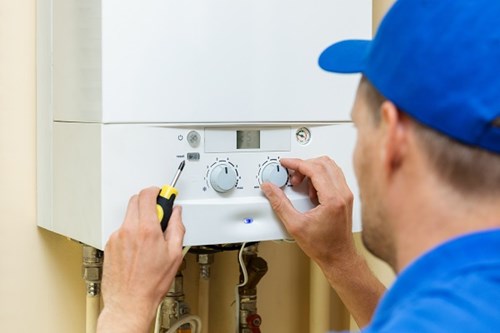How To Check If Your Boiler Thermostat Is Working
Has your boiler thermostat stopped working? Our boiler experts offer repairs at low prices and are here to help fix your thermostat, offering advice along the way.
Realising that all is not well with your boiler thermostat can be a fairly unpleasant experience. Thoughts of having no hot water for days on end flash through your mind, not to mention potentially having to shell out a small fortune to replace it.
But not all boiler problems are terminal, and thankfully the most common issues are quick and inexpensive to fix. Chief among these is a faulty boiler thermostat.

What Is A Boiler Thermostat?
Your boiler thermostat is the component that controls the temperature of your central heating and/or hot water. So if you have a modern combination boiler with a remote control unit, when you decide your house is a bit chilly and turn the heating up, your controller sends a signal to the thermostat. That then in turn tells your boiler to fire a bit more to warm the water in the system up to the required temperature.
If you have an old fashioned immersion heater system, the thermostat is likewise what controls the temperature in the tank when you switch it on.
There are a number of signs that your thermostat could be on the blink. The most obvious one is that you try to turn your central heating on or up, and nothing happens - or that you’re suddenly only getting cold water out of both taps. This is usually what makes people panic that their boiler has packed in, but it could easily just be a thermostat issue.
Alternatively, you could find the opposite happening - your water suddenly becomes too hot to touch, or your central heating is on too high and you can’t turn it down. Although this is just as problematic as a lack of heat, at least you know your boiler is still firing.
Boiler Thermostat Testing
To confirm that it is most likely a boiler thermostat problem, shut down the system, turn the temperature on your controller down to zero, and do the same with any in-room thermostats if you have them. Turn it on again, but keep your hot water off so you can check the central heating first.
Turn up the temperature on the boiler thermostat, checking to see if your boiler fires. If it doesn’t, there’s one more thing you can eliminate before calling an engineer to take a look. If you are using a remote control unit, try replacing the batteries - it could be that low power is preventing the signal from getting through to the boiler.
If the boiler does fire up when you switch your central heating back on, give it 15 minutes and then check that your radiators are warming up to a temperature you’d expect from what you set the thermostat at. If you set it to 20oC, for example, but your radiators are still only lukewarm, your next step is to try to bleed the system to get the air out of it before calling in professional help.
If you are happy your central heating is behaving as you’d expect, shut the system down again and now try your hot water. With a combi boiler, this is simply a case of turning the system back on and running the hot tap. With an immersion heater and cylinder, you would have to set the water temperature and then wait 30 minutes or so to check if it has warmed up.
Expert Boiler Repairs
Although replacing a thermostat is one of the more straightforward repair jobs for a boiler, you would be advised not to try it yourself unless you have professional experience with electrics. If you do the above and you’re not getting the response from your system you’d expect, call out a qualified local engineer in your area through Go Assist.

